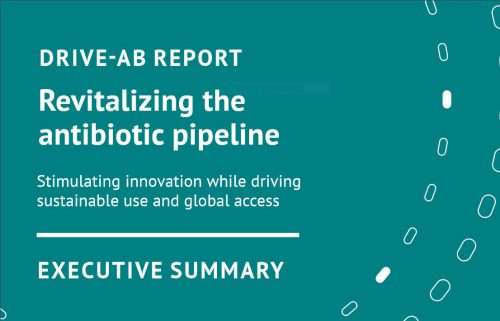Today we are reached by the final report from DRIVE-AB with the headline: “Revitalizing the Antibiotic Pipeline“. The context is that “The current pipeline for innovative antibiotics in various stages of R&D is insufficient, potentially delivering no more than one innovative antibiotic for a “critical” World Health Organization (WHO) priority pathogen within the next five years.”, the report say in the beginning. A key reason for the DRIVE-AB report is to bring recommendations and guidance in the present context, when we are facing increased antibiotic resistance on a global scale.
One of the main recommendations is that countries should increase funding for AMR.
“Countries should make long-term commitments to continue financing of antibacterial R&D and ideally increase push funding by about 50 per cent.”, states the report.
DRIVE-AB finds that: “There may be capacity within existing multinational grant funding agencies – e.g. CARB-X, GARDP, JPIAMR (Joint Programming Initiative on Antimicrobial Resistance) – to absorb and effectively deploy more capital.”
So, we are happy to see that JPIAMR is acknowledged as a key organisation and vehicle, among others, who are trusted with the mission to fund even more research in order to harness AMR on a global scale. Since JPIAMR is coordinating research and funding for it’s 26 member nations – it fits very well to expand the operations in this direction.
The Drive-AB report continues: “Owing to the existing pipeline, much of this immediate funding should be placed in early- and mid-stage grants until the pipeline becomes more robust. Granting agencies should have specific calls for research targeting pathogens that pose the most urgent public health threats (e.g. WHO’s priority pathogens list for the discovery phase and TPPs for the development phase).”
The ongoing JPIAMR call for “New targets, compounds and tools – innovating against antibiotic resistant bacteria“, is a perfect example how countries are pooling resources and research to collaborate. This call responds to WHOs list of priority pathogens just as the report recommends.
However, funding is linked with the ability to both reach and enable researcher to apply for funds. This is something many more entities in the AMR field could collaborate on to a greater extent. If researchers are not aware of available funds and contexts to support research, we may miss opportunities to support research that can be life changing for the many.

